Filter by

Root, Tuber and Banana Food System Innovations
Graham Thiele is director of the CGIAR Research Program on Roots, Tubers and Bananas, led by the International Potato Center (CIP), bringing together multiple partners to improve food security and reduce rural poverty through research for development. He holds an MSc in Agricultural Economics from the University of London and a PhD in Anthropology from Cambridge. He began his career at the UKâ€â€¦
- Edition
- -
- ISBN/ISSN
- 978-3-030-92022-7
- Collation
- -
- Series Title
- -
- Call Number
- -
Implementing Responsible Research and Innovation: Organisational and National…
This open access book offers a unique and practically oriented study of organisational and national conditions for implementing Responsible Research Innovation (RRI) policies and practices. It gives the reader a thorough understanding of the different aspects of RRI, and of barriers and drivers of implementation of RRI related policies. It shows how different organisational and national context…
- Edition
- -
- ISBN/ISSN
- -
- Collation
- -
- Series Title
- -
- Call Number
- -
Self-tracking
People keep track. In the eighteenth century, Benjamin Franklin kept charts of time spent and virtues lived up to. Today, people use technology to self-track: hours slept, steps taken, calories consumed, medications administered. Ninety million wearable sensors were shipped in 2014 to help us gather data about our lives. This book examines how people record, analyze, and reflect on this data, l…
- Edition
- -
- ISBN/ISSN
- 9780262334693
- Collation
- 1 online resource (xi, 233 pages) :illustrations.
- Series Title
- -
- Call Number
- -

Sharing cities :a case for truly smart and sustainable cities
The work makes a case for understanding cities as shared spaces and venues for collaboration; and proposes policies and practices to share cities fairly. It argues that with modern technologies the intersection of urban space and cyberspace provides an unrivalled platform for more just, inclusive and environmentally efficient economies and societies rooted in a sharing culture.OCLC-licensed ven…
- Edition
- -
- ISBN/ISSN
- 9780262329705
- Collation
- 1 online resource (x, 445 pages) :illustrations.
- Series Title
- -
- Call Number
- -
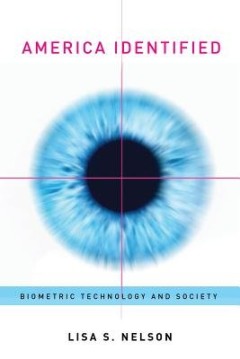
America Identified: Biometric Technology and Society
An examination of the public perception of biometric identification technology in the context of privacy, security & civil liberties.OCLC-licensed vendor bibliographic record.
- Edition
- -
- ISBN/ISSN
- 9780262289689
- Collation
- 1 online resource (viii, 258 pages) :illustrations
- Series Title
- -
- Call Number
- -
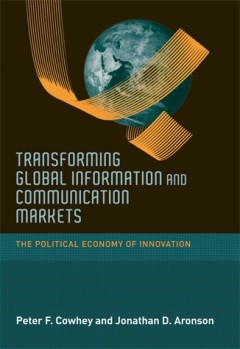
Transforming Global Information and Communication Markets: The Political Econ…
Innovation in information and communication technology (ICT) fuels the growth of the global economy. This examination of ICT from a political economy perspective argues that innovation and economic growth require new approaches in global governance that will reconcile diverse interests and enable competition to flourish.
- Edition
- -
- ISBN/ISSN
- 9780262255066
- Collation
- -
- Series Title
- -
- Call Number
- -
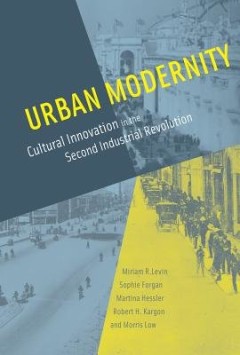
Urban Modernity: Cultural Innovation in the Second Industrial Revolution
At the close of the 19th century, industrialization and urbanization marked the end of the traditional understanding of society as rooted in agriculture. This book examines the construction of an urban-centred, industrial-based culture - an entirely new social reality based on science and technology.OCLC-licensed vendor bibliographic record.
- Edition
- -
- ISBN/ISSN
- 9780262265935
- Collation
- 1 online resource (x, 272 pages) :illustrations, maps
- Series Title
- -
- Call Number
- -
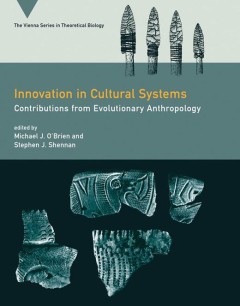
Innovation in Cultural Systems: Contributions from Evolutionary Anthropology
Here, leading scholars offer a range of perspectives on the roles played by innovation in the evolution of human culture. The contributors consider innovation in biological terms discussing epistemology, animal studies, systematics and phylogeny, phenotypic plasticity and evolvability, and much more.OCLC-licensed vendor bibliographic record.
- Edition
- -
- ISBN/ISSN
- 9780262259101
- Collation
- 1 online resource (xi, 284 pages) :illustrations.
- Series Title
- -
- Call Number
- -
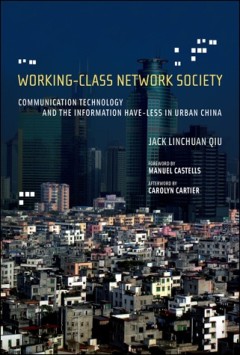
Working-Class Network Society: Communication Technology and the Information H…
This is an examination of how the availability of low-end information and communication technology has provided a basis for the emergence of a working-class network society in China.
- Edition
- -
- ISBN/ISSN
- 9780262255073
- Collation
- -
- Series Title
- -
- Call Number
- -
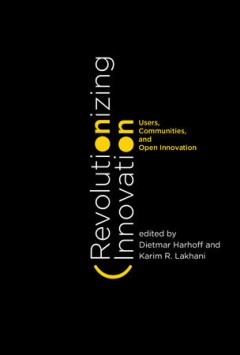
Revolutionizing innovation :users, communities, and open innovation
The last two decades have witnessed an extraordinary growth of new models of managing and organizing the innovation process that emphasizes users over producers. Large parts of the knowledge economy now routinely rely on users, communities, and open innovation approaches to solve important technological and organizational problems. This view of innovation, pioneered by the economist Eric von Hi…
- Edition
- -
- ISBN/ISSN
- 9780262331524
- Collation
- 1 online resource (xv, 577 pages) :illustrations
- Series Title
- -
- Call Number
- -
 Computer Science, Information & General Works
Computer Science, Information & General Works  Philosophy & Psychology
Philosophy & Psychology  Religion
Religion  Social Sciences
Social Sciences  Language
Language  Pure Science
Pure Science  Applied Sciences
Applied Sciences  Art & Recreation
Art & Recreation  Literature
Literature  History & Geography
History & Geography